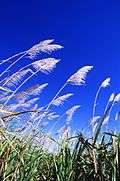Distillers grains
Distillers grains are a cereal byproduct of the distillation process.
There are two main sources of these grains. The traditional sources were from brewers. More recently, ethanol plants are a growing source. It is created in distilleries by drying mash, and is subsequently sold for a variety of purposes, usually as fodder for livestock (especially ruminants). Corn-based distillers grains from the ethanol industry are commonly sold as a high protein livestock feed that increases efficiency and lowers the risk of subacute acidosis in beef cattle.[1]
Recently, studies indicate that DDGS as a food source for human consumption may have some benefit in reducing heart disease risk.[2]
Wet and dry distillers grains
There are two common types of distillers grains.
- Wet Distillers Grains (WDG) contain primarily unfermented grain residues (protein, fibre, fat and up to 70% moisture). WDG has a shelf life of four to five days. Due to the water content, WDG transport is usually economically viable within 200 km of the ethanol production facility.
- Dried Distillers Grains with Solubles (DDGS) is WDG that has been dried with the concentrated thin stillage to 10-12 percent moisture (Figure 1). DDGS have an almost indefinite shelf life and may be shipped to any market regardless of its proximity to an ethanol plant. Drying is costly, as it requires further energy input. In the US, it is packaged and traded as a commodity product
Production
In beer or whiskey production, grains, such as corn, are ground to a coarse consistency and added to hot water. After cooling, yeast is added and the mixture ferments for several days to one week. The solids remaining after fermentation are the distillers grains.
The conversion rate of grains to ethanol and distillers grains varies with the different types of grains and the process used. The details are outlined below:
- The conversion rate of corn to distillers grains is: One tonne of corn produces 378 L of ethanol and 479 kg WDG (70% moisture content), or 309 kg of DDGS (10% moisture content).
- The conversion rate of wheat to distillers grains is: One tonne of wheat produces 372 L of ethanol and 457 kg WDG (70% moisture content), or 295 kg of DDGS (10% moisture content).[3]
